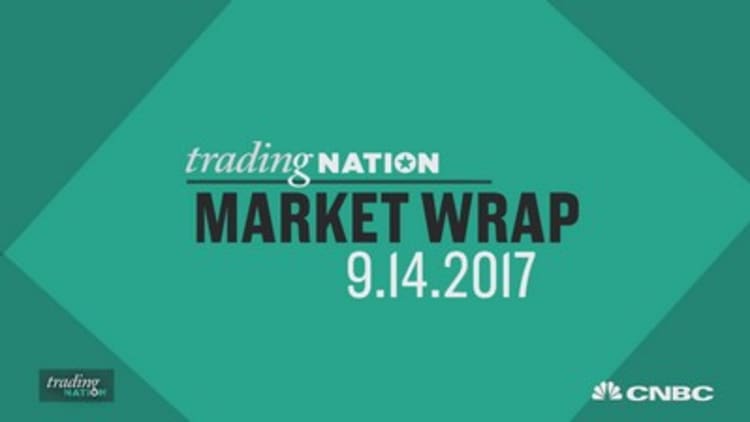
U.S. equities closed mostly lower on Thursday after strong inflation data raised the possibility of tighter monetary policy from the Federal Reserve.
The Dow Jones industrial average rose 45.30 points to close at 22,203.48, a record. Boeing and United Technologies contributed the most to the gains. The aerospace company said late Wednesday it will raise production of its 787 Dreamliner jets to 14 per month in 2019.
The briefly hit an intraday record before closing 0.1 percent lower at 2,495.62. Consumer discretionary led decliners and utilities outperformed. The Nasdaq composite underperformed, declining 0.5 percent to close at 6,429.08.
Major U.S. Indexes
The Consumer Price Index rose 1.9 percent in August on a year-over-year basis. Economists polled by Reuters expected an increase of 1.8 percent. Lifting consumer prices higher were gasoline and rent costs.
"This is the first time you're seeing inflation go higher in a while," said Adam Sarhan, CEO of 50 Park Investments. "As inflation goes higher, that puts pressure on p/e ratios."
Investors closely watched the data looking for clues about the future of the Fed's monetary policy. Market expectations for a Fed rate hike in December increased to 52.9 percent from 41.3 percent after the data were released, according to the CME Group's FedWatch tool.
Treasury yields briefly ticked higher on the strong inflation numbers. The benchmark 10-year yield rose to 2.22 percent, before trading at 2.197 percent. The dollar also rose momentarily before giving back its gains against a basket of major currencies.
"Overall, the inflation numbers have been below the Fed's target of 2 percent. That's why you're seeing the market call the Fed's bluff to an extent," said Minh Trang, senior FX trader at Silicon Valley Bank. "This has been going on for the whole year. It's really been a poker game between the Fed and the market."
The Dow, S&P and Nasdaq are coming off back-to-back record sessions and had jumped at least 1 percent for the week entering the session.
"Short-term momentum remains positive behind the SPX, supporting the rally off of the August low. The breakout above July's peak makes the path of least resistance higher, and it reflects healthy market breadth, or participation," said Katie Stockton, chief technical strategist at BTIG, in a note.
"We think short-term overbought conditions — which are widespread — will be absorbed via a consolidation phase versus a significant near-term pullback," Stockton said.
Wall Street also paid close attention to geopolitical tension amid reports that North Korea may be preparing to test an intercontinental ballistic missile. The report came just days after the U.N. Security Council imposed sanctions on the Asian country.
Stocks fell sharply earlier this month after North Korea successfully tested a hydrogen bomb, but they were able to quickly regain their footing.
"What you're seeing is people digesting the information they get, but at the same time it's very hard to handicap situations like these," said Lisa Erickson, head of traditional investments at U.S. Bank Wealth Management. At the same time, "We've got solid macro fundamentals. It's not the most exciting environment, but overall, things looks good."


